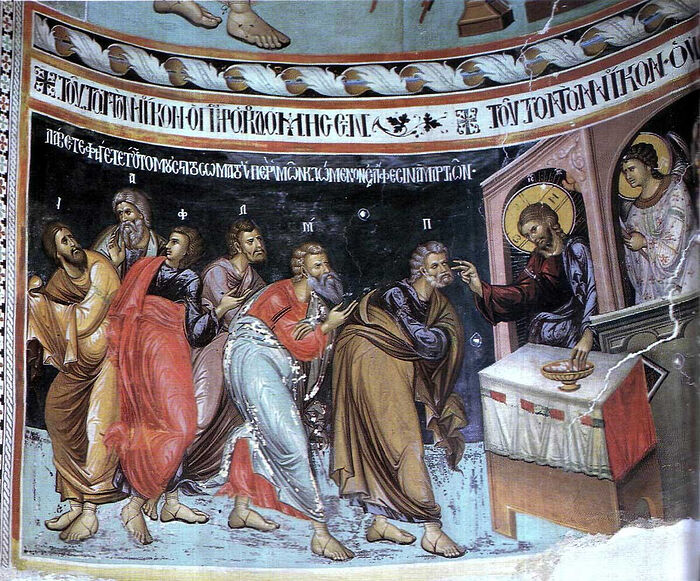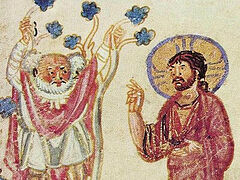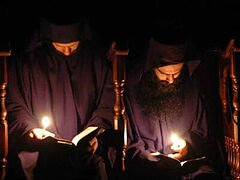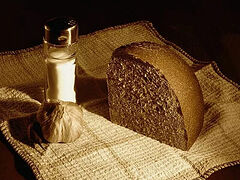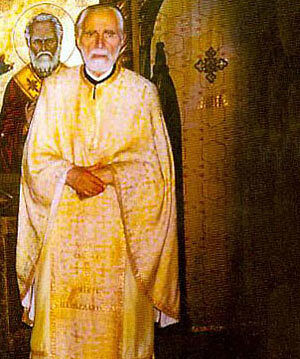 Fr. Miron Mihailescu Fr. Miron Mihailescu is a Romanian ascetic of piety. He was born on January 22, 1914, in Hunedoara County. From 1926 to 1933, he studied at the lyceum in Alba Iulia, and then from 1934 to 1938 at St. Andrew’s Theological Academy in Sibiu. One of his teachers was the famous professor Archpriest Dumitru Staniloae, and he became his close friend and secretary. He maintained close friendly relations with the great confessors Hieromonk Arsenie (Boca), Teofil (Pereyan), and Seraphim (Popescu).
Fr. Miron Mihailescu Fr. Miron Mihailescu is a Romanian ascetic of piety. He was born on January 22, 1914, in Hunedoara County. From 1926 to 1933, he studied at the lyceum in Alba Iulia, and then from 1934 to 1938 at St. Andrew’s Theological Academy in Sibiu. One of his teachers was the famous professor Archpriest Dumitru Staniloae, and he became his close friend and secretary. He maintained close friendly relations with the great confessors Hieromonk Arsenie (Boca), Teofil (Pereyan), and Seraphim (Popescu).
He got married in 1939 at the age of twenty-five, and on October 25 of the same year, he was ordained to the priesthood. For fifty-nine years, to the end of his life, he consistently served the Liturgy nearly every day in the Church of the Nativity of St. John the Baptist in the city of Ocna Sibiului. He led a holy life and enjoyed the great love of the faithful, and raised up worthy disciples. He reposed in the Lord on September 11, 1998, at the age of eighty-four. After his death, his disciples gathered his words and published them in three books: To Love Like God (2004), God Speaks (2005), and The Divine Liturgy: Our Daily Bread (2007).
***
Can the children of the bridechamber mourn, as long as the Bridegroom is with them? but the days will come, when the Bridegroom shall be taken from them, and then shall they fast (Mt. 9:15).
“Now you rejoice to the measure of My joy; you rejoice because we are feasting together; because you are with Me. But when I’m gone, then you will fast; then your hearts will expand”—this is the meaning of fasting—“in order to wait for Me. Once I’m gone, you will wait for Me; your heart will overflow with expectation!”
From us is required a heart that could withstand being consumed in the spiritual fire of love. In Lent, we illuminate it (in the Biblical sense of the word; cf. Ps. 11:7) in the truest light of expectation. It’s no longer attached to anything. And what else should our hearts be attached to if not to fasting? This is Lent.
The sons of the bridal chamber can’t mourn! They’ll be overflowing with joy because He’s with them; they’ll have no reason to worry, because the Bridegroom is with them, Whom they plainly partake of. You truly fast when you partake of God. True life is fasting, in the sense that it no longer involves any earthly vanity. When the Bridegroom is gone, fasting prepares the heart to wait patiently for the joy of the Resurrection.
In fact, fasting is a state befitting human nature, normal for a man created for eternal communion with the Creator. True life is unceasing fasting. You fast, that is, you renounce all vanity to make room for Christ. Thus, fasting is the expansion of the heart, so it could be filled with the Divine energies. As the Savior says in the desert: Man shall not live by bread alone, but by every word that proceedeth out of the mouth of God (Mt. 4:4).
“Whoever doesn’t eat of Me has no life in him” (cf. Jn. 6:53). If you’re with Him (like the Disciples), you can’t but partake of Him when you have Him. Why did He offer Himself to be eaten as bread and wine? Because fallen man can’t survive without food and because the process of its assimilation is internal, intimate, personal.
“You are with Me. Receive My Body to feel that you are with Me. When you no longer see Me, then you will fast, and you will find that you have nothing to eat. But why will you fast? So as not to replace Me with other food when I’m gone. You’ll understand that it’s impossible to eat anything else.”
How many thoughts are inspired by the Savior’s words!
“You were with Me”—thus, the Disciples weren’t threatened with the risk that their minds would be corrupted and that they would start eating something else. “When I was with you, you fed on Me, the only Giver of Life—My presence with you. Being with you, with My very Person I presented the life of the Father, which I offered to you. But when I’m gone, then, of course, you will fast. After all, when you suffer a lot, it doesn’t occur to you to start eating or doing anything.”
“When you no longer have Me with you, then you will truly fast, and at the same time learn to recognize what a man can eat, and you’ll see that he doesn’t eat bread alone.”
As the Savior responded to the devil:
Man shall not live by bread alone, but by every word that proceedeth out of the mouth of God (Mt. 4:4)—by every word that preserves life, coming from God alone.
This is the meaning of fasting!
If someone is used to eating only bread in his daily life, without remembering God, then he needs some time to practice refusing bread, so he could sense the power of grace that supports true life.
If fasting is a discipline that’s quite difficult, at least at first, then why is it that when Lent comes, no one is scared, and some even rejoice? Because not burdening the body and not feeding the instincts with animal products opens the channels of the Divine energies. Bodily hunger turns into desire—the hunger of the heart for God. When I feed upon the truths of God, there’s no longer room for other food. What meaning the Savior gives to fasting, and how superficially people are accustomed to understanding it!
And who will fast?
“You who have known Me will fast. Whoever doesn’t know Me cannot fast, but whoever knows Me will be able to. If it’s difficult and unpleasant for someone to fast, that means he doesn’t know Me, and in reality, doesn’t know God.”
Fasting isn’t appointed for the body. The body can’t sin. It doesn’t play any role by itself, as the Savior says. Abstinence is performed by the mind, the spirit. In normal cases, the body doesn’t abstain. The mind sets a healthy measure of eating for the body.

